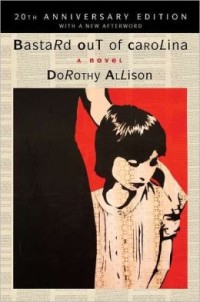Bastard Out Of Carolina
by Dorothy Allison
Banning History:
In 1995 the book was removed from class curriculums at Mount Abram High School of Salem, Maine due to concerns over content and language. Eventually the ban was overturned through the appeals process, but a judge upheld the school’s banning and throughout the entirety of Maine because of the graphic content, through the Maine Judicial Supreme Courts.
In 2009 and 2010 Allison’s book, “Bastard Out Of Carolina” was banned by Washington High School in Fremont, California. According to the President of the School Board, Lily Mei, “I didn’t feel it was of substantial educational value. The Color Purple is more uplifting…there are characters out there that go through rape and abuse and have better endings.” Based on Mei’s characterizations of what Fremont’s standards are for subversive literature, a happy ending is required. A trustee for the district agreed with Mei stating, “While students may be academically prepared, emotionally they may not be.” This statement was directed at the suggestion that it would be appropriate for students in the AP English courses.
In response to the annual book bans going on in Fremont, a free book club began being hosted at Irvington District Church each Wednesday evening to cover material that the Fremont School District banned. The group was led by the Washington High School teacher, Teri Hu, the petitioner that tried repeatedly to remove bans and get them back into the curriculum. The banned books that they covered were sold at each group meeting and free ones were given out to anyone who could not afford to purchase them.
When the book was adapted into a film for TNT it was banned by the Canadian Maritime Film Classification Board. Eventually it was aired on Showtime after an appeals process in 1997. The film directed by Anjelica Houston, stars Ron Eldard as Daddy Glen, and Jena Malone as Bone Boatwright.
Author Bio
Dorothy Allison’s childhood in Greenville, South Carolina can be described as traumatic at best, at worst an all out, seemingly never-ending and inescapable nightmare. Born to Ruth Gibson Allison, a destitute fifteen-year-old single mother, who dropped out of school to wait tables to try and support her family. Allison was repeatedly beaten and raped by her step-father starting at the age of four-years-old until she was eleven. She eventually was able to tell a relative and although her mother was horrified that this had been going on, vowed it would no longer happen, yet remained with Allison’s step-father. The abuse then further commenced for another five years, eventually leading to a diagnoses of gonorrhea that she contracted from her step-father rendering her unable to have children because it had gone undetected for so long. Allison eventually left the home to go to college when she turned eighteen, on a scholarship to Florida Presbyterian College.
Allison’s life experiences inspired her semi-autobiographical book “Bastard Out of Carolina,” which was published as fiction after almost a decade of writing it in 1992. Three years later she did write the performance piece that was turned into a memoir, “Two Or Three Things I Know For Sure,” which is a non-fiction work that depicts the events of her childhood without any fictionalization. Because much of her work is dominated with themes of sexual abuse, class struggle and feminism she has long been an activist for children and women’s rights, and was also a writer in residence at Columbia College Chicago in 2006.
Discussion Questions
1. What are the central themes to the novel?
2. What are the literary merits of the form, language, context of the book?
3. What does the banning of this work say about the feminist movement in regards to the content?
4. How can this work be used to advocate for children and women?
